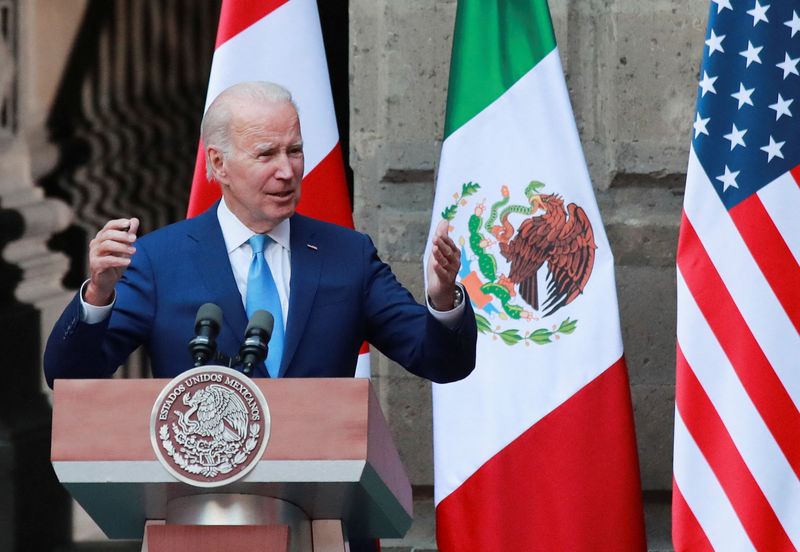By Lizbeth Diaz
MEXICO CITY (Reuters) - The United States is looking to Canada to help cope with the growing number of migrants at the United States' border with Mexico, a State Department spokeswoman said on Tuesday.
A possible trilateral agreement with Canada, the United States and Mexico was on the table as the three countries met in Mexico for the North American Leaders' Summit, spokewsoman Kristina Rosales told Reuters.
The agreement would help thousands immigrate through legal channels, without having to put their lives at risk at the hands of human traffickers, Rosales said.
"Canada has its own specific programs for refuge and migration," Rosales said, telling Reuters ahead of the trilateral talks that the countries would discuss Canada's involvement.
No such agreement was made public immediately after the talks between U.S. President Joe Biden, Canadian Prime Minister Justin Trudeau and Mexican President Andres Manuel Lopez Obrador ended on Tuesday.
U.S. authorities detained 2.2 million migrants at the border with Mexico in fiscal year 2022, a record not seen since World War II.
Rosales also said the United States is considering including more nationalities to enter the country by air while expelling those crossing over land under an order known as Title 42.
The order, launched in October for Venezuelans, was expanded to Cuban, Nicaraguan and Haitian migrants last week.
Encounters of Venezuelans at the border dropped about 90% in December, and similar drops are expected for other migrants in the program.
"If we see that we have to increase the number of those eligible for humanitarian parole per month and include other nationalities, we will consider it," Rosales added.
Mexico's Lopez Obrador said Tuesday the nation "celebrated" the U.S. decision to award humanitarian parole and that he believed "that this plan will be extended to benefit other countries."
The United States has in recent months seen a significant increase in migrants reaching the country by sea from Caribbean countries such as Cuba and Haiti. Rosales said those who arrived in the United States by sea "unfortunately will not be able to qualify" for humanitarian parole.

Rosales added that the U.S. government is seeking to broaden legal methods of immigrating and sway potential migrants from paying human traffickers.
"We want to broaden the legal channels so that people can apply directly from their cell phones," Rosales said.